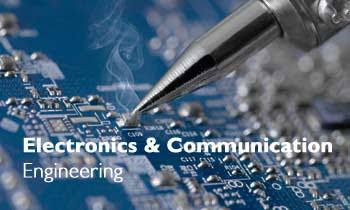Department of Electronics & Communication Engineering
About
Welcome to the realm of Electronics and Communication Engineering (ECE), a field that powers our modern world’s communication systems, electronics, and technological innovations. ECE professionals design, develop, and maintain the systems that connect people, enable global communication, and drive technological progress.
Vision of ECE Department
To be recognised by the society at large as a full-fledged department, offering quality higher education in the Electronics and Communication Engineering field with research focus catering to the needs of the public and staying in tune with the advancing technological revolution and challenging cultural changes.
Mission of ECE Department
M1: To engage modern education aids, laboratories and competent faculty ensuring effective teaching learning process to meet the ever growing and changing industrial and business environment. .
M2: To continuously challenge the young minds with ideas to carry out innovative research through interaction with the research organizations & industry.
M3: To develop responsible citizens and professional leaders with high ethical and moral values, who contribute to the dissemination of universal science and technology.
PROGRAM OUTCOMES
| PO1 | Engineering Knowledge: Apply Reasoning informed by the contextual knowledge to assess societal, health, safety, legal and cultural issues and the consequent responsibilities relevant to the professional engineering practice |
| PO2 | Problem Analysis: Identify, Formulate, review research literature and analyze complex engineering problems to arrive at substantiated conclusions using first principles of mathematics, natural and engineering sciences. |
| PO3 | Design/Development of Solutions: Design solutions for complex engineering problems and design system components, processes to meet the specifications with consideration for the public health and safety, and the cultural, societal, and environmental considerations. |
| PO4 | Conduct Investigations of Complex Problems: Use research-based knowledge including design of experiments, analysis and interpretation of data, and synthesis of the information to provide valid conclusions. |
| PO5 | Modern Tool Usage: Create, select, and apply appropriate techniques, resources, and modern engineering and IT tools including prediction and modelling to complex engineering activities with an understanding of the limitations. |
| PO6 | The Engineer and Society: Apply Reasoning informed by the contextual knowledge to assess societal, health, safety, legal and cultural issues and the consequent responsibilities relevant to the professional engineering practice |
| PO7 | Environment and Sustainability: Understand the impact of the professional engineering solutions in societal and environmental contexts, and demonstrate the knowledge of, and need for sustainable development |
| PO8 | Ethics: Apply Ethical Principles and commit to professional ethics and responsibilities and norms of the engineering practice |
| PO9 | Individual and Team Work: Function effectively as an individual and as a member or leader in teams and in multidisciplinary Settings |
| PO10 | Communication: Communicate effectively with the engineering community and with society at large. Be able to comprehend and write effective reports documentation. Make effective presentations, and give and receive clear instructions. |
| PO11 | Project Management and Finance: Demonstrate knowledge and understanding of engineering and management principles and Apply these to one’s own work, as a member and leader in a team. Manage projects in multidisciplinary environments. |
| PO12 | Life-Long Learning: Recognize the need for, and have the preparation and ability to engage in independent and life-long learning in the broadest context of technological change. |
Program Educational Objectives
PEO1: To prepare Graduates with a sound foundation in fundamentals of basic sciences and to assist them exhibit strong, independent learning, analytical & problem-solving skills in Electronics and Communication Engineering domain.
PEO2: To facilitate learning in the core field of Electronics and Communication Engineering so as to integrate technological progression and software & firmware skills to produce high impact, energy-efficient, and futuristic solutions.
PEO3:To prepare Graduates to effectively use modern equipment and programming tools to solve real-life multi-disciplinary problems that are technically sound, economically feasible, and socially acceptable..
PEO4:To inculcate professional and ethical attitude, team spirit, leadership qualities, and effective communication skills in Graduates and to make them aware of their social responsibilities.
Program Specific Outcomes
PSO-1: Apply the fundamental concepts of electronics and communication engineering to design a variety of components and systems for real-time applications.
PSO-2: Select and apply cutting-edge engineering hardware and software tools to solve complex Electronics and Communication Engineering problems.





